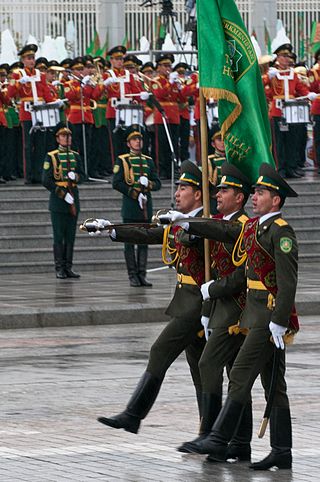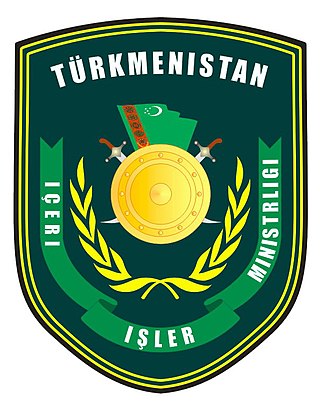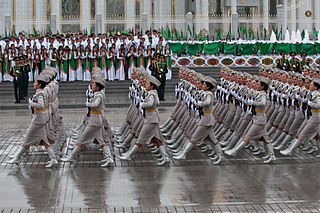Related Research Articles

The politics of Turkmenistan nominally takes place in the framework of a presidential republic, whereby the President of Turkmenistan is nominally both head of state and head of government. However, as of 21 January 2023 a "national leader" was appointed who chairs an independent People's Council (viz.) with authority to amend the constitution, and who exercises supreme political authority. No true opposition parties are allowed; every registered political party supports the third and current President Serdar Berdimuhamedow. The country is frequently described as a totalitarian state.

Turkmenistan is a landlocked country in Central Asia bordered by Kazakhstan to the northwest, Uzbekistan to the north, east and northeast, Afghanistan to the southeast, Iran to the south and southwest and the Caspian Sea to the west. Ashgabat is the capital and largest city. It is one of the six independent Turkic states. The population is about seven million and is thus the lowest of the Central Asian republics, and Turkmenistan is one of the most sparsely populated nations in Asia.
The "State Anthem of Turkmenistan", also known as the "National Anthem of Independent Neutral Turkmenistan", was adopted as the national anthem of Turkmenistan in 1996, then again with modified lyrics in 2008. The music was composed by Turkmenistani composer Veli Mukhatov, who also composed the music of the Turkmen SSR's regional anthem.

Turkmenistan's human rights record has been heavily criticized by various countries and scholars worldwide. Standards in education and health declined markedly during the rule of President Saparmurat Niyazov.

Ogulsapar Muradova was a Turkmen human rights activist and Radio Free Europe journalist.

The Ministry for National Security or MNS is the secret police agency for the government of Turkmenistan. It is composed largely of the remnants of KGB organs left over after the collapse of the Soviet Union; its functions remain largely the same as well. The MNB and the national police force are under the direction of the Ministry of Internal Affairs. Until 2002, it was known as the KNB.
According to U.S. government estimates, in 2022 Turkmenistan is 89% Muslim, 9% Eastern Orthodox Christian and 2% other religions. In 2023, the country was scored zero out of 4 for religious freedom; it was noted that restrictions have tightened since 2016. In the same year it was ranked the 26th worst place in the world to be a Christian.

Saparmurat Atayevich Niyazov, also known as Türkmenbaşy, was a Turkmen politician who ruled Turkmenistan from 1985 until his death in 2006. He was first secretary of the Turkmen Communist Party from 1985 until 1991 and supported the 1991 Soviet coup attempt. He continued to rule Turkmenistan for 15 years after independence from the Soviet Union in 1991.

The Central Bank of Turkmenistan is the national bank of Turkmenistan. It is located in the centre of Ashgabat. It was established in 1991 and regulates the country's banking system and supervises the national financial policy.

The list of Turkmenistan-related articles is below
Russians in Turkmenistan are a minority ethnic group, numbering 297,913 as of 2000 census representing 4% of the population. Most ethnic Russians migrated to Turkmenistan during the 20th century. Many settlements were founded in the north of the country. The Russian population reached its peak just before the breakup of the Soviet Union. Most ethnic Russians live in the capital city of Turkmenistan, Ashgabat. Significant populations are found in other major cities. The main religion of Russians in Turkmenistan is Russian Orthodoxy.

French-Turkmen relations are the bilateral relations between France and Turkmenistan. France has an embassy in Ashgabat and Turkmenistan has an embassy in Paris. Both countries are full members of the OSCE and the United Nations.

The Ministry of Internal Affairs is the interior ministry or national police force of Turkmenistan. The ministry directly controls the Turkmen police force, consisting of about 25,000 personnel, and works with the Ministry for National Security on matters of law enforcement and national defense. The primary tasks of the police force include maintaining law and public security, crime prevention and investigation, passport control, road and fire safety, and international cooperation in law enforcement. The ministry works with INTERPOL. The current minister is Mämmethan Çakyýew. The ministry was founded on February 19, 1998, by decree of President Saparmurat Niyazov “On the formation of the police of Turkmenistan”.
The Communist Party of Turkmenistan is a banned communist political party in Turkmenistan that was founded in 1998.

The Armed Forces of Turkmenistan currently funds 2 high ranking educational institutions: The Military Academy of Turkmenistan and the Military Institute of the Ministry of Defense of Turkmenistan. Aside from those two schools, there are several military schools around the country, specializing in the training of personnel of a branches of service. In the early 1990s when the armed forces were rapidly being developed, many officers were trained in the Russian Federation's Ministry of Defense, while at least 300 officers were sent to schools in Turkey. On 3 October 1992, the Turkmen State University created the first Turkmen educational department. This article lists institutions of the Turkmen Armed Forces based on its respective agency and service branch.
Begench Amandurdievich Beknazarov was a military officer in the Armed Forces of Turkmenistan, who was sentenced to life in 2005 for his alleged role in the assassination attempt on President of Turkmenistan Saparmurat Niyazov. He was sent into hiding following the November 2002 attack and remained in hiding until his 2005 capture. He is also the nephew of former Turkmen Foreign Minister and political prisoner Boris Şyhmyradow.
Major General Akmurad Nazarovich Kabulov is a Turkmen general and politician.
Omruzak Omarkuliev is a citizen of Turkmenistan and civic activist who was sentenced to 20 years "deprivation of liberty." Omarkuliev's current status is not known as he has been allowed no visitors and the Turkmen authorities will not release his location.

The Walk of Health is a 36-kilometre (22 mi) long concrete walkway that runs alongside the Kopet Dag mountain range in south Ashgabat, Turkmenistan, near the Iran–Turkmenistan border. The first 8 km (5.0 mi) of the path was constructed in 1999 by dictator Saparmurat Niyazov, with the intent of encouraging citizens to be healthy. It officially opened on 2 January 2000. Until Niyazov's death, he required his ministers to walk the walkway once every year.
Batyr Kurbanovich Sarjaev was a Turkmen politician and the former minister of defense of Turkmenistan.
References
- 1 2 3 4 Denber, Rachel (13 May 2019). "End A Dissident's Ordeal in Turkmenistan". Human Rights Watch. Retrieved 22 September 2022.
- 1 2 3 4 5 6 "Gulgeldy Annaniyazov". Tom Lantos Human Rights Commission. Retrieved 22 September 2022.
- 1 2 "Gulgeldy Annaniyazov" (PDF). uscirf.gov. United States Commission on International Religious Freedom. Retrieved 22 September 2022.
- 1 2 "Annaniyazov, Gulgeldy". Prove They Are Alive!. 7 October 2020. Retrieved 22 September 2022.
- ↑ "Gulgeldy Annaniyazov v. Turkmenistan, Working Group on Arbitrary Detention, Opinion No. 22/2013, U.N. Doc. A/HRC/WGAD/2013/22 (2014)". University of Minnesota Human Rights Library. 2 April 2014. Retrieved 22 September 2022.
- 1 2 "Dissident Gulgeldy Annaniyazov sentenced again before the end of his prior prison term". Chronicles of Turkmenistan. 10 May 2019. Retrieved 22 September 2022.
- 1 2 "ENFORCED DISAPPEARANCES IN TURKMENISTAN'S PRISONS MUST END" (PDF). 27 September 2019. Retrieved 22 September 2022.
- 1 2 "U.S. Lawmakers Urge Turkmen President To Release Political Prisoners". Radio Free Europe/Radio Liberty. 18 November 2021. Retrieved 22 September 2022.
- ↑ "Turkmenistan: A grain of untruth". 28 May 2019. Retrieved 22 September 2022.
- ↑ Tavernise, Sabrina (27 January 2003). "Show Trials like Stalin's in Turkmenistan". The New York Times. Retrieved 22 September 2022.
- 1 2 3 "INDIVIDUALS CONTINUE TO BE AT RISK OF VIOLATIONS IN TURKMENISTAN" (PDF). Amnesty International. Retrieved 22 September 2022.
- 1 2 "OSCE HDIM" (PDF). osce.org . 30 September 2009. Retrieved 22 September 2022.
- ↑ "EBRD must maintain demands that Turkmenistan and Belarus meet set requirements". Human Rights House. 11 April 2012. Retrieved 22 September 2022.
- 1 2 Kvile, Robert (27 February 2014). "STATEMENT IN RESPONSE TO THE ADDRESS BY THE DEPUTY CHAIRMAN OF THE CABINET OF MINISTERS AND MINISTER FOR FOREIGN AFFAIRS OF TURKMENISTAN, H.E. RASHID MEREDOV" (PDF). Norway.no. Retrieved 22 September 2022.
- ↑ "HDIM 2019 Any Other Business: Moscow Mechanism – Turkmenistan, Belarus". 27 September 2019. Retrieved 22 September 2022.
- ↑ "Romney Joins Call on Central Asian Leaders to Release Unjustly Detained Prisoners at High Risk of COVID-19". Mitt Romney. 30 June 2020. Retrieved 22 September 2022.
This article needs additional or more specific categories .(October 2022) |